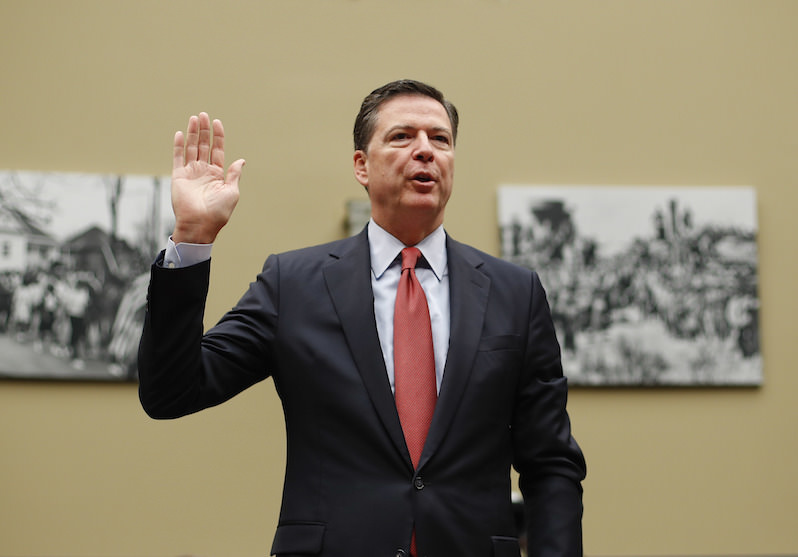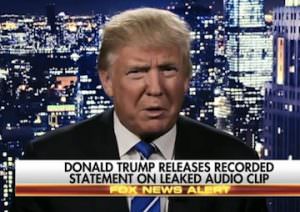Trump’s Allies Plan to Treat Comey Like a Political Opponent
The stakes for Thursday's hearing are regarded as being nearly as high as those surrounding the "Access Hollywood" Trump tape crisis. Then FBI Director James Comey is sworn in before the House Judiciary Committee in September. (Pablo Martinez Monsivais / AP)
Then FBI Director James Comey is sworn in before the House Judiciary Committee in September. (Pablo Martinez Monsivais / AP)
By Kevin Cirilli and Jennifer Jacobs / Bloomberg
Then FBI Director James Comey is sworn in before the House Judiciary Committee in September. (Pablo Martinez Monsivais / AP)
The White House is mobilizing to defend President Donald Trump during ousted FBI Director James Comey’s Senate testimony, an effort comparable to preparations for the presidential debate following the release of an Access Hollywood tape that nearly derailed his campaign.
Marc Kasowitz, Trump’s private counsel for the Russia investigation, was at the White House on Wednesday morning. He is playing a central role in internal strategy for any fallout from Comey’s testimony.
An outside rapid-response operation spans the Republican National Committee and SuperPACs supporting Trump. It will be led by Katie Walsh, his former deputy chief of staff who left the White House in March to join a pro-Trump group, America First Policies, according to two Republican officials.
Mike Dubke, who recently resigned as White House communications director, is orchestrating the effort with Walsh, working directly with an RNC team led by communications aides Lindsay Jancek and Michael Ahrens, the two officials said.
The stakes for Thursday’s hearing are regarded as nearly as high as the Access Hollywood crisis, when a tape leaked to the Washington Post revealed Trump making sexist and disparaging comments about women, two people familiar with the preparations said.
The Trump surrogates will look to catch Comey in misstatements or even perjury, by comparing his remarks Thursday to prior testimony in May when he said no one had sought to interfere in the FBI’s investigation into Russian meddling in the election.
Republican senators say they’ll ask Comey why he didn’t tell Congress at the time it allegedly happened that Trump asked him to drop an FBI investigation of his former national security adviser, Michael Flynn.
He may also be asked whether he wrote the same sorts of memos on his conversations with former President Barack Obama that he is said to have done after meeting with Trump. And he can expect to be pressed anew on the now-closed FBI investigation of Hillary Clinton’s use of a private email server as secretary of state.
John Cornyn, of Texas, the no. 2 Republican in the Senate, is the closest to an ally Trump has on the committee. He backed Trump’s firing of Comey, called Deputy Attorney General Rod Rosenstein’s memo supporting the move “compelling,” and seriously considered replacing Comey as FBI director.
Two Republican members of the Intelligence Committee, Marco Rubio of Florida and Tom Cotton of Arkansas, dined with Trump at the White House Tuesday night. They discussed the president’s recent international trip, North Korea and other policy matters, a person familiar with the dinner said. Comey wasn’t discussed, the person said.
Comey won’t say on Thursday whether he thinks the president sought to derail the Flynn investigation or a probe into the Trump campaign’s ties to Russian government officials, according to a person familiar with his thinking. However, he is expected to describe several conversations with the president.
Some of Trump’s closest political aides, especially those who were with him on the campaign trail, have a deep sense that justice is on their side and that it will eventually become clear that they did nothing wrong, two White House officials said.
Two of Trump’s most trusted surrogates, sons Eric and Don Jr., have already popped up on television defending their father ahead of the hearings, including a joint appearance Tuesday on ABC’s “Good Morning America.”
“My father’s a great man and he’s going to do a great job of this country. But honestly we have to bring some principle back. They would rather have him fail than have America succeed,” Eric Trump said on Fox’s “Hannity” on Tuesday. “I really believe that that’s the ugliness of Washington D.C.”
Eric also said that Democrats are “not even people,” a comment that drew criticism from the Anne Frank Center for Mutual Respect and others.
Your support matters…Independent journalism is under threat and overshadowed by heavily funded mainstream media.
You can help level the playing field. Become a member.
Your tax-deductible contribution keeps us digging beneath the headlines to give you thought-provoking, investigative reporting and analysis that unearths what's really happening- without compromise.
Give today to support our courageous, independent journalists.


You need to be a supporter to comment.
There are currently no responses to this article.
Be the first to respond.